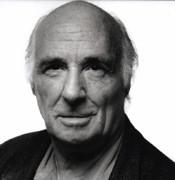Poet
Jacques Roubaud

Jacques Roubaud
(France, 1932)
© Pieter Vandermeer
Biography
In Sweden, Någonting svart was chosen by the poetry critics as the best collection of 2008. The first person to be amazed at this was the author himself, Jacques Roubaud (1932). For we are dealing here with a Swedish translation of Quelque chose noire (Something Black), the original of which appeared in 1986, when it was awarded the Prix France-Culture in France. More than two decades later, the collection continues to fascinate readers, also in translation.
The reason why Something Black makes such an impact on the reader has perhaps something to do with the fact that the autobiography – the ‘real’ autobiography this time – constantly seems to elude Roubaud’s attempts to restrict his grief via poetic forms. The poetic powerlessness to grasp death is just as much the subject of the collection as death is itself.
Today, Jacques Roubaud’s work belongs to the pinnacle of French literature – not only his poetry but also his prose and essays. As far as his prose is concerned, I would point to the novel trilogy about Hortensia, where, in an astonishing way, he makes use of Oulipo (workshop of potential literature) procedures, i.e. constraints that partially determine the construction of the novel. Among his essays, I would refer to his ‘Defence of Poetry’, which he read at the Poetry International Festival in Rotterdam in 2002. It is a defence that would seem to be more of an attack, since in it he formulated a fierce protest against the laziness of present-day poetry, discernible in the lack of awareness of form. In his most recent collections – such as The Form of a City Changes Faster, Alas, Than the Human Heart (1999) and Churchill 40 and other Travel Sonnets (2004) – Roubaud demonstrates that, aged seventy-six, he is absolutely not a poet resting on his laurels but one who indefatigably continues to develop new forms on the basis of what has been inherited from all languages and all ages.
© Jan H. Mysjkin (Translated by John Irons)
[Jacques Roubaud is to appear at the Poetry International Festival, Rotterdam in June 2009. This text has been written for that occasion.]Select bibliography
Mono no aware: Le Sentiment des choses (1970); Renga (1971); Trente et un au cube (1973); Mezura (1975); Autobiographie, chapitre dix (1977); La Vieillesse d'Alexandre: Essai sur quelques états récents du vers français (1978); Dors, précédé de Dire la poésie (1981); Quelque chose noir (1986); La Plurité des mondes de Lewis (1991); Monsieur Goodman rêve de chats (1994); La forme d'une ville change plus vite, hélas, que le cœur des humains. Cent cinquante poèmes. 1991-1998 (1999), Churchill 40 et autres sonnets de voyage (2004); Eros mélancolique (co-written with Anne F. Garréta)(2009)
Links
Jacques Roubaud on Lyrikline
Poems
Poems of Jacques Roubaud
Sponsors
























